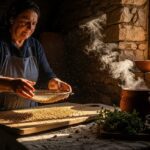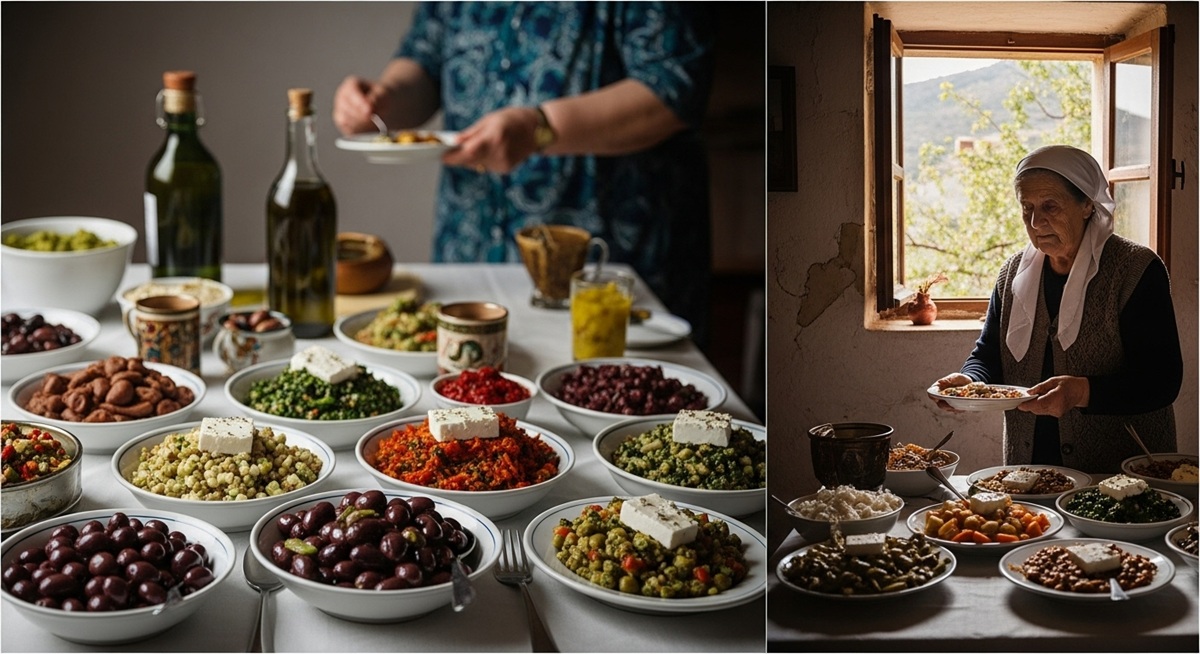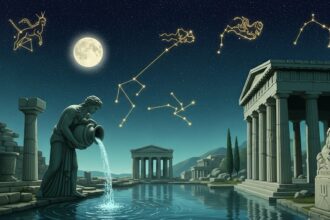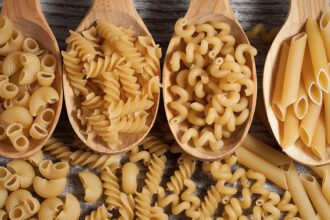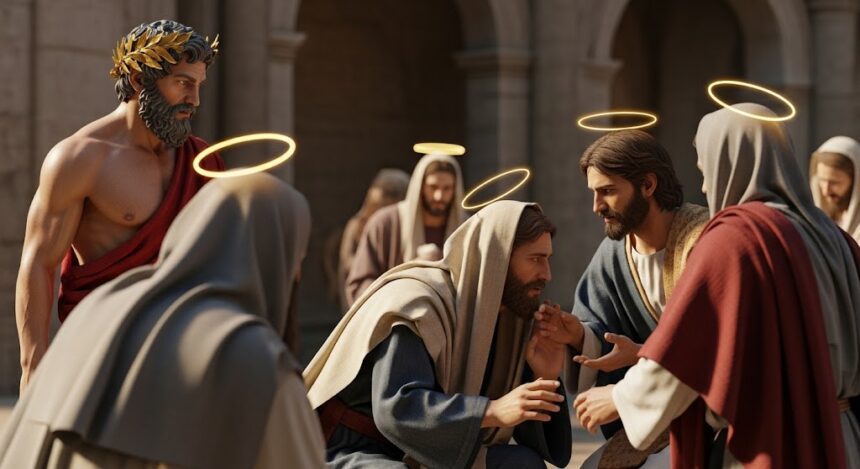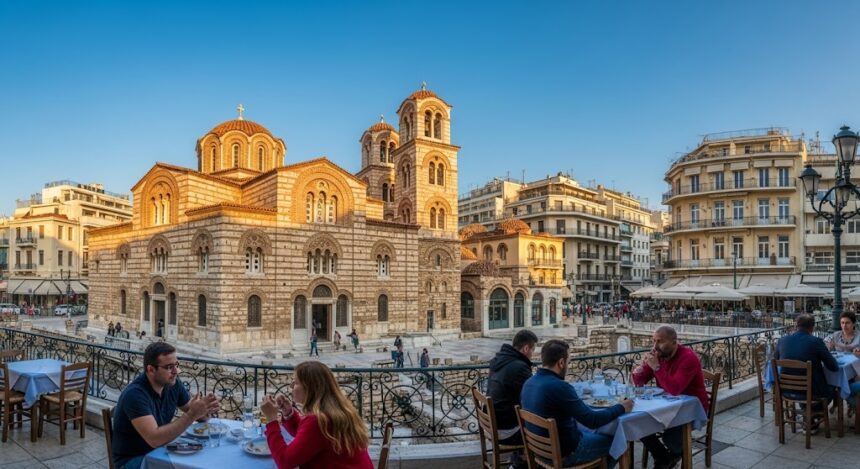Step onto Greek soil during Great Lent, and you’ll immediately sense a shift in the air. It’s subtle, yet profound, like the quiet hum of an ancient melody weaving through the everyday bustle. This is an immersive cultural experience, a deep spiritual journey that resonates across the islands and mainland, touching everything from family meals to quiet church services. For Orthodox Greeks, Lent, known as Sarakosti (Σαρακοστή), is one of the most important periods of the liturgical year, a profound odyssey of spiritual cleansing, prayer, and abstinence that culminates in the triumphant celebration of Easter (Pascha) – the brightest and most beloved holiday.
This significant period begins, with the joyful, yet reflective, observance of Clean Monday (Καθαρά Δευτέρα), marking the start of seven weeks dedicated to inner reflection and purification. It’s a time when the collective Greek consciousness turns inward, preparing not just their bodies, but their very souls, for the glory of Christ’s Resurrection. Far from being a somber obligation, it is, for many, a beautiful and intentional pause in the relentless pace of modern life, an opportunity to reconnect with deeper truths and ancient rhythms. It’s an essential Greek cultural practice that continues to shape identity and foster community, even in an increasingly secular world.
The Deep Roots: Fasting’s Echoes in Orthodox History and Ancient Myths
The tradition of Greek fasting traditions is not a modern invention; its roots stretch back through millennia, finding fertile ground in both the austere demands of early Christian asceticism and, subtly, in the broader human inclination towards purification and mindful living.
The Orthodox Lent: A Time of Spiritual Cleansing
At its heart, Greek Orthodox fasting is a direct inheritance from the early Christian Church, drawing inspiration from Christ’s 40 days of fasting in the desert and the apostles’ own practices of spiritual preparation. It’s built on a theology that views the human being as a holistic unity of body and soul. Therefore, disciplining the body through dietary restrictions is seen not as an end in itself, but as a means to free the spirit, sharpen the mind, and draw closer to God. The act of abstaining becomes a constant, tangible reminder of a higher purpose, fostering humility and self-control.
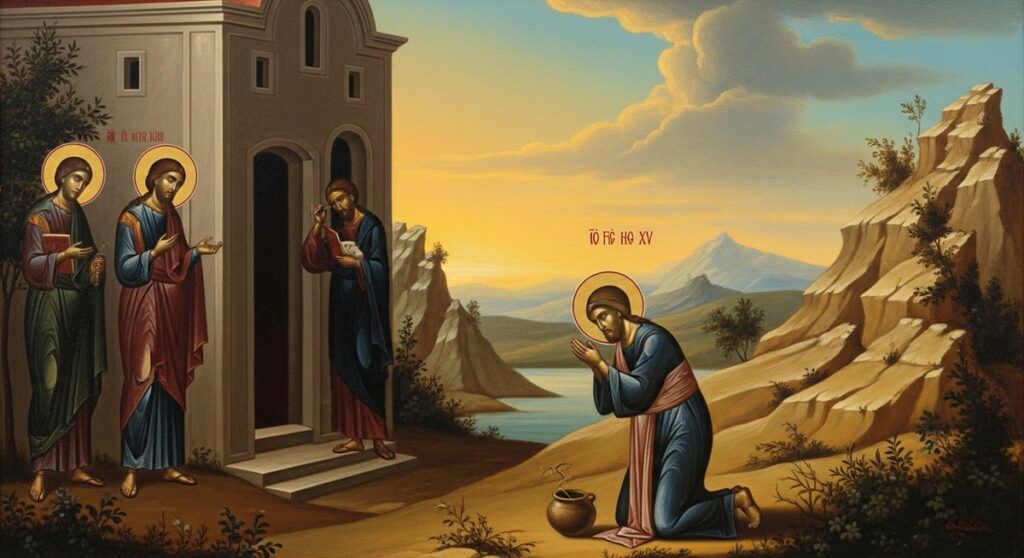
Great Lent itself is meticulously structured, its spiritual progression marked by specific dates and observances. Clean Monday, also known as “Pure Monday,” signifies a fresh start, a symbolic sweeping away of spiritual dust before embarking on the Lenten path. It is a day marked by outdoor activities, kite-flying, and the consumption of simple, traditional Lenten foods, embodying a sense of release and joyful anticipation. The period extends for seven weeks, with the profound liturgical services leading into the Bright Resurrection of Christ. Each week brings its own thematic focus, guiding believers through a journey of repentance, contemplation, and renewed faith, making the final feast of Easter all the more triumphant and meaningful. This long period of abstinence is intended to cultivate a state of spiritual readiness, a profound encounter with the divine.
Echoes from Antiquity: Beyond Christian Practice
While firmly rooted in Orthodox Christianity, the concept of temporary abstinence or ritual purification resonates with practices found in ancient civilizations, including those of ancient Greece. Though not directly tied to the Orthodox Lent, the ancient Greeks held various rites and festivals that emphasized purity, discipline, and communal observance. Philosophers like Pythagoras advocated for vegetarianism and dietary restraint as pathways to intellectual clarity and moral virtue. Many cults and mystery religions practiced periods of ritual fasting or dietary limitations as preparation for sacred ceremonies or to achieve altered states of consciousness, seeking a deeper connection to the divine or the cosmic order.
This underlying human impulse towards self-discipline as a means of spiritual cleansing and heightened awareness suggests a continuous thread of thought across millennia. Orthodox fasting, therefore, builds upon a deep-seated human understanding that the physical and the spiritual are intertwined, and that tempering one can elevate the other. It taps into a collective memory of seeking wisdom and purification through intentional restraint, making it a profound Greek cultural practice that feels both ancient and eternally relevant.
The Rhythms of the Fast: How Greeks Observe Lent Today
Observing Lent in Greece is a multifaceted experience, extending far beyond simply altering one’s diet. It involves a conscious effort to realign priorities, cultivate virtues, and deepen one’s connection with the spiritual realm.
The Culinary Canvas: Navigating Food Restrictions
The most visible aspect of Greek fasting traditions is undoubtedly the food restrictions. The rules are clear: throughout Great Lent, it is strictly forbidden to eat meat, including poultry, as well as all dairy products and eggs. This means no cheese, milk, yogurt, butter, or any dishes containing these animal products. The diet shifts predominantly to a plant-based approach.
However, Lent is not about deprivation in the sense of hunger, but about mindful consumption. The allowed foods form a surprisingly rich and diverse culinary landscape. Seafood without a backbone (like squid, octopus, and shrimp) is permitted for most of the fast, offering delicious and nutritious options. On specific feast days, such as the Annunciation and Palm Sunday, the consumption of fish is permitted, bringing a welcome, celebratory break in the stricter fast. The rest of the time, the Greek Lenten kitchen thrives on an abundance of legumes, fresh vegetables, vibrant fruits, and wholesome nuts. Olive oil, a staple of Greek cuisine, is generally allowed, providing healthy fats and flavor.
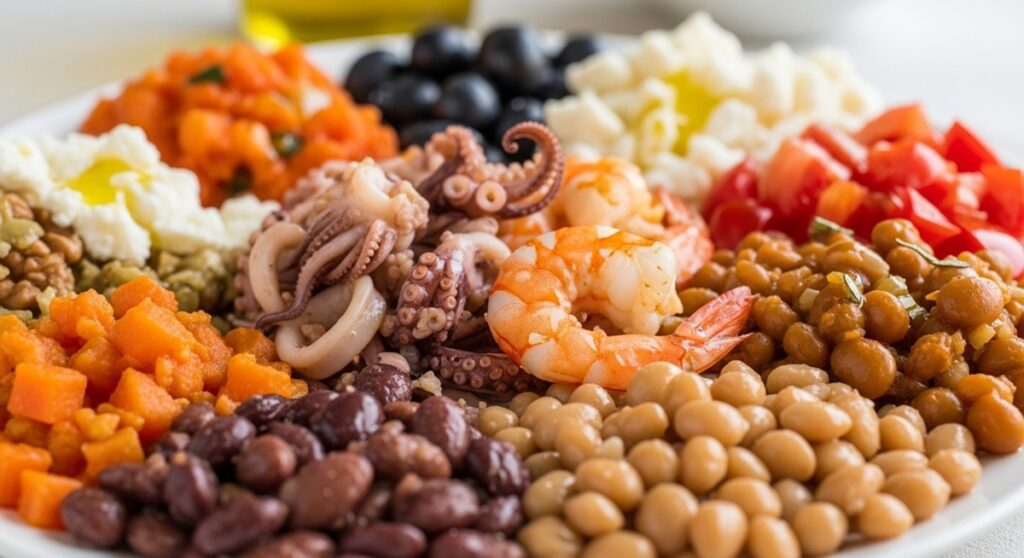
Traditional Lenten dishes are a testament to Greek ingenuity and culinary heritage:
- Fasolada: A hearty and warming traditional white bean soup with tomatoes, carrots, and onions, often hailed as Greece’s national dish. It’s simple, nutritious, and incredibly satisfying.
- Gigantes: Large baked beans in a rich tomato sauce, often seasoned with aromatic herbs like parsley and dill. They are a staple of Lenten tables, providing protein and comfort.
- Dolmades (Yalanci): Grape leaves (or sometimes cabbage leaves) stuffed with rice and spices, often cooked with fresh herbs. The Lenten version is meat-free, focusing on the fragrant rice and herbs.
- Hummus and Baba Ganoush: While originally Middle Eastern, these chickpea and eggplant dips have become popular and readily available lenten menu items in modern Greece, perfect with fresh bread or vegetables.
- Lagana: A unique, special flat bread that is typically baked only on Clean Monday. It’s a symbolic, unleavened bread, often topped with sesame seeds, and its preparation is a joyful part of ushering in Lent.
- Seafood: Beyond squid and octopus, shrimp cooked with olive oil and spices are a common sight, offering delightful flavors and textures within the permissible boundaries of the fast.
Spiritual Cleansing and Church Life
While food is a noticeable component, the true essence of Lent lies in its spiritual dimensions. During this period, believers are more likely to attend church services, which become more frequent and contemplative. The hauntingly beautiful Byzantine hymns sung during Lenten services evoke a profound sense of introspection and reverence. Many Orthodox Christians participate more actively in confession and take communion, deepening their spiritual journey and seeking forgiveness.
Lent is emphatically not only a rejection of certain foods, but also a time for reflection, prayer, and good deeds. It encourages a conscious detachment from worldly distractions, fostering a deeper engagement with one’s inner self and one’s relationship with the divine. Acts of charity, forgiveness, and extended periods of personal prayer are emphasized, helping to cultivate virtues like humility, patience, and compassion. This holistic approach makes the fast a period of profound spiritual cleansing, preparing the soul for the ultimate celebration of Christ’s victory over death.
Modern Adaptations: Tradition in a Changing World
In modern Greece, the observance of Lent varies. It’s true that not all Greeks strictly observe the fast to its fullest extent, especially in bustling urban centers where the pace of life makes strict adherence challenging. For some, it might be a partial observance, abstaining from meat but allowing dairy, or observing only the first and last weeks strictly.
However, the tradition is still alive and deeply ingrained in the cultural fabric. Many families, even if not strictly religious, will collectively refuse meat and dairy products for the entire period out of cultural habit or respect for tradition. Restaurants and supermarkets readily offer special lenten menus (nistisima), making it easy for both observers and curious diners to participate in the culinary side of the fast. Special services are held in churches, attracting large congregations who come to absorb the solemn yet hopeful atmosphere, reminding everyone of the importance of humility and spiritual growth. The aroma of incense often fills the air, and the echoes of ancient hymns serve as a powerful reminder of this collective journey. Lent remains an integral part of the rhythm of Greek life, subtly uniting people in a shared pursuit of inner harmony.
The Benefits Beyond Belief: Health and Spiritual Harmony
The practice of Greek fasting traditions offers a powerful dual benefit, enriching both the physical body and the ethereal soul. It’s a practical approach to wellness that many are rediscovering, even outside a purely religious context.
A Time for the Body: The Health Benefits of a Lenten Diet
From a purely nutritional standpoint, the Lenten diet, with its emphasis on legumes, vegetables, fruits, nuts, and seafood, is remarkably healthy. It naturally leads to a higher intake of fiber, vitamins, minerals, and healthy fats while reducing saturated fat and cholesterol. This shift towards a more plant-based eating pattern can contribute to:
- Improved Cardiovascular Health: Lowering consumption of red meat and dairy can reduce risk factors for heart disease.
- Weight Management: A diet rich in fiber and plant-based proteins can promote satiety and aid in healthy weight management.
- Detoxification: While the body naturally detoxifies, a lighter, plant-focused diet can support digestive health and provide a break from processed foods often consumed in the everyday diet.
- Mindful Eating: The restrictions inherently encourage greater awareness of what one consumes, fostering a more mindful relationship with food. This aligns perfectly with the wellness aspect of Psyness.com, promoting self-awareness not just of the mind, but also the body.
A Feast for the Soul: Spiritual Growth and Humility
Beyond the tangible health benefits, the primary aim of Orthodox fasting is spiritual growth. It’s a deliberate act of self-discipline, fostering virtues that are often overlooked in a consumer-driven world. By consciously abstaining from certain pleasures, individuals cultivate:
- Humility: Recognizing one’s dependence on something greater than oneself and practicing self-restraint.
- Self-Control: Strengthening willpower and resisting immediate gratification, which can translate into other areas of life.
- Reflection and Introspection: The simplicity of the diet and increased time for prayer and church attendance encourages a deeper look inward, prompting self-assessment and a renewed sense of purpose. This is the very essence of unpacking the peculiar psyche.
- Empathy and Charity: The awareness of one’s own voluntary sacrifice often inspires greater compassion for those who are involuntarily in need, leading to increased acts of charity and kindness.
This period of disciplined living is seen as a vital preparation for Easter, transforming the internal landscape, making the celebration of Christ’s Resurrection not just an external holiday, but a deeply felt, internal renewal. The self-denial of Lent makes the eventual feast of Easter, with its traditional lamb and red eggs, an even more joyous and vibrant explosion of life and light, symbolizing the triumph of spirit.
Embarking on a Spiritual Journey: Fasting and Travel in Greece
For the curious traveler seeking more than just sun and sand, experiencing Greek fasting traditions firsthand can offer a profoundly unique and enriching journey. It’s a chance for spiritual fasting travel, delving into the soul of Orthodox Greece and its enduring cultural heart.
Sacred Sanctuaries: Visiting Monasteries in Greece
Greece is dotted with countless monasteries, many perched dramatically on cliffsides, nestled in serene valleys, or offering breathtaking views from mountain peaks. These are not just historical sites; they are living, breathing centers of Orthodox spirituality, many of which continue to observe the Lenten fast with unwavering devotion.
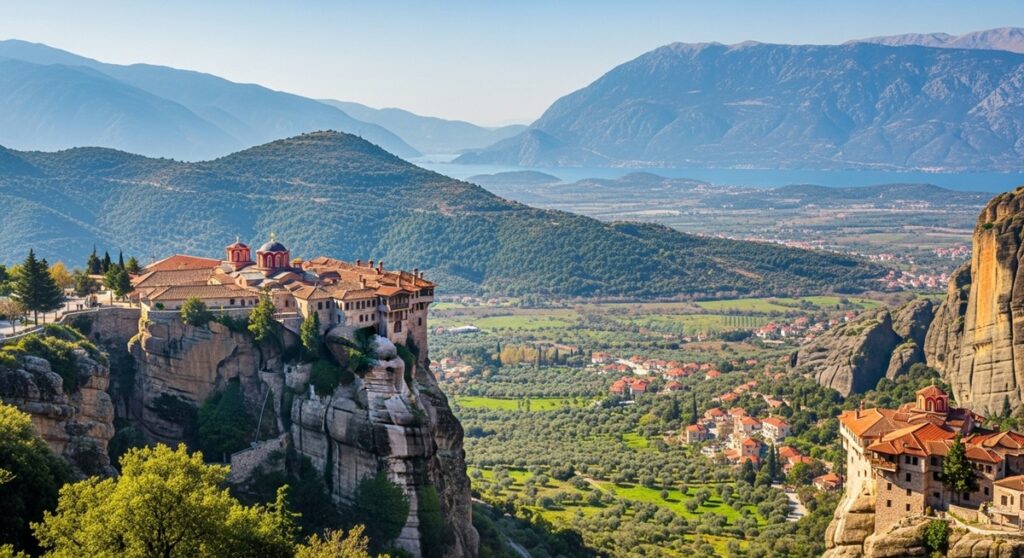
Visiting monastery retreats Greece during Lent provides an unparalleled opportunity for immersion. While not all monasteries offer formal retreats for laypeople, many welcome respectful visitors who wish to observe and participate in the liturgical life. The atmosphere is one of profound peace and quiet contemplation. Witnessing the monks and nuns engaged in their daily prayers, hearing the ancient chants, and experiencing the simplicity of their Lenten meals can be a deeply moving and transformative experience. Places like Meteora, Mount Athos (for male pilgrims), or even smaller, secluded monasteries on islands offer a chance to disconnect from the frantic pace of the outside world and reconnect with one’s inner self, much like the purpose of fasting itself. It’s an authentic way to engage with Greek cultural practices at their spiritual core.
Cultural Immersion: Experiencing Lent as a Traveler
Even if formal spiritual fasting travel is not your primary goal, simply being in Greece during Great Lent offers a unique window into Greek cultural practices. You’ll notice:
- Lenten Menus: Restaurants proudly advertise
Nistisima(fasting) dishes. This is an invitation to explore the delicious and healthy plant-based side of Greek cuisine that might otherwise be overlooked. It’s a culinary journey in itself. - Atmosphere: While not overtly somber, there’s a noticeable shift towards introspection and quietude, particularly in the lead-up to Holy Week.
- Community Spirit: Observe how families gather for Lenten meals, sharing simple, wholesome food and strengthening their bonds. The communal aspect of the fast, even if not strictly observed by every individual, unites people in a shared heritage.
- Easter Preparation: Witness the gradual preparations for Easter, the grand crescendo of the Lenten period. From the buying of candles to the baking of traditional Easter breads, the anticipation builds, culminating in the joyous celebrations of Holy Saturday and Easter Sunday. Understanding the fast makes the feast all the more profound.
This immersive experience offers a genuine insight into the Orthodox Greece lifestyle, revealing a country deeply connected to its spiritual and historical roots, even in the bustling rhythm of modern life. It’s an ideal way for visitors to deepen their appreciation for the resilience and richness of Greek culture.
Your Personal Unpacking: Embracing the Spirit of Lent
The journey of Great Lent in Greece is a vivid reminder that culture, spirituality, and even our relationship with food are deeply intertwined. It’s a period of intentional living, collective memory, and individual growth.
Ultimately, whether or not to fast is a personal decision. However, understanding the profound cultural and spiritual significance of Greek fasting traditions can offer a unique lens through which to view Greece and even your own relationship with discipline, reflection, and spiritual growth.


